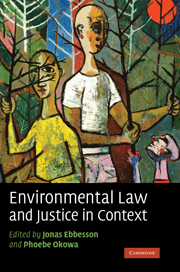Book contents
- Frontmatter
- Contents
- List of contributors
- Preface and acknowledgments
- 1 Introduction: dimensions of justice in environmental law
- Part I The notion of justice in environmental law
- 2 The second cycle of ecological urgency: an environmental justice perspective
- 3 Describing the elephant: international justice and environmental law
- 4 Law, justice and rights: some implications of a global perspective
- 5 Gender and environmental law and justice: thoughts on sustainable masculinities
- Part II Public participation and access to the judiciary
- Part III State sovereignty and state borders
- Part IV North–South concerns in global contexts
- Part V Access to natural resources
- Part VI Corporate activities and trade
- Index
- References
2 - The second cycle of ecological urgency: an environmental justice perspective
from Part I - The notion of justice in environmental law
Published online by Cambridge University Press: 28 June 2009
- Frontmatter
- Contents
- List of contributors
- Preface and acknowledgments
- 1 Introduction: dimensions of justice in environmental law
- Part I The notion of justice in environmental law
- 2 The second cycle of ecological urgency: an environmental justice perspective
- 3 Describing the elephant: international justice and environmental law
- 4 Law, justice and rights: some implications of a global perspective
- 5 Gender and environmental law and justice: thoughts on sustainable masculinities
- Part II Public participation and access to the judiciary
- Part III State sovereignty and state borders
- Part IV North–South concerns in global contexts
- Part V Access to natural resources
- Part VI Corporate activities and trade
- Index
- References
Summary
Ecological urgency and environmental justice: two views
There has for several years existed a growing consensus among experts that a circumstance of ecological urgency on a global scale exists. What is new and potentially hopeful, is the rapidly increasing public acceptance of the reality of this urgency, at least with respect to climate change, and a resulting willingness of politicians across the political spectrum to put environmental protection high on their agenda. Encouraging as this is from the perspective of prospects for action, it could still produce a variety of regressive results if the impacts of policy adjustment fall heavily on the poor and vulnerable, and even more invisibly on future generations. It is crucial to bring environmental justice concerns in from the shadow lands of concern where they have long been consigned.
Without assessing the substantive character of ecological urgency on which there exists some divergence of opinion, Gus Speth and Peter Haas in their book Global Environmental Governance formulate a three-part conclusion that seems beyond controversy: (1) the conditions relating to the global environment are worsening; (2) current responses to address these conditions are grossly insufficient; and (3) major new initiatives are needed that address the root causes.
The identification of root causes remains, although to a diminishing degree, somewhat contested, at least as far as selecting the primary explanation of this set of disturbing circumstances, and what to do about it.
- Type
- Chapter
- Information
- Environmental Law and Justice in Context , pp. 39 - 54Publisher: Cambridge University PressPrint publication year: 2009
References
- 1
- Cited by



